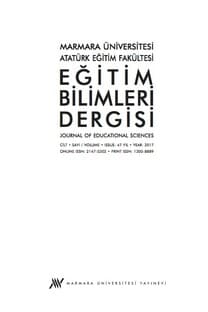DÜŞÜNCE TARZLARI VE BEŞ BÜYÜK KİŞİLİK ÖZELLİĞİN TEKRAR GÖZDEN GEÇİRİLMESİ
Bu çalışmanın iki amacı vardır. Birincisi kişilik ölçümünün ötesinde, zihinsel tarzların (genel olarak bilme, kavrama ve düşünce tarzları çerçevesinde) ölçümünün yararını daha fazla ortaya çıkarmaktır. İkincisi ise, Sternberg’in (1988) kişisel zihin yönetimi teorisinin, akademik çevre kadar akademik olmayan çevreye de uygulanabileceğini kanıtlamaktır. Düşünce Tarzları Envanteri (Sternberg & Wagner, 1992) ve NEO Beş-Faktör Envanteri (Costa & McCrae, 1992) Çin’deki 199 ilköğretim (secondary) okulu öğrencisinin ebeveynlerine uygulandı. Bulgular incelenen kişilik özelliklerindeki Zihinsel tarzların anlamlı olduğunu gösterdi. Sonuçlar akademik ve akademik olmayan çevrelerdeki Sternberg’in kişisel zihin yönetimi teorisinin geçerliliğini desteklemektedir.
Anahtar Kelimeler:
Düşünce tarzları, kişilik özellikleri
ABSTRACT
The purpose of the present study was to investigate the relationship between thinkingstyles and the big five personality traits. One-hundred-and-fifty-four (mean age 20 years)second-year university students from Hong Kong participated in the study. Participantsresponded to the Thinking Styles Inventory based on Sternberg’s theory of mental selfgovernmentand to the NEO Five-Factor Inventory (NEO-FFI, Costa & McCare, 1992).Although significant relationships were identified between particular thinking styles andcertain personality traits, it was included that it is premature to claim that a personalitymeasure, such as the NEO-FFI can be used to measure thinking styles.Key words: Thinking styles; personality traits.
Keywords:
-,
___
- Zhang, L.F. and Huang, J.F.(2001). Thinking styles and the big five-factor model of personality. European Journal of Personality. 15, 465- 476.
- Zhang, L.F. & Sternberg, R.J. (2005). A threefold model of intellectual styles, Educational Psychology Review 17 (1),1- 53.
- ISSN: 1300-8889
- Yayın Aralığı: Yılda 2 Sayı
- Başlangıç: 1989
- Yayıncı: Marmara Üniversitesi
Sayıdaki Diğer Makaleler
DÜŞÜNCE TARZLARI VE BEŞ BÜYÜK KİŞİLİK ÖZELLİĞİN TEKRAR GÖZDEN GEÇİRİLMESİ
ÜNİVERSİTELERİN SOSYAL BİLGİLER ÖĞRETMENLİĞİNİ SEÇEN ÖĞRENCİLERİN BAZI SOSYO-KÜLTÜREL NİTELİKLERİ
MÜZİK ÖĞRETMENLERİNİN MESLEKİ YETERLİKLERİNİN İNCELENMESİ VE DEĞERLENDİRİLMESİ
BİREYSEL DEĞERLER ENVANTERİ’NİN DİLSEL EŞDEĞERLİK GEÇERLİK VE GÜVENİRLİK ÇALIŞMASI
